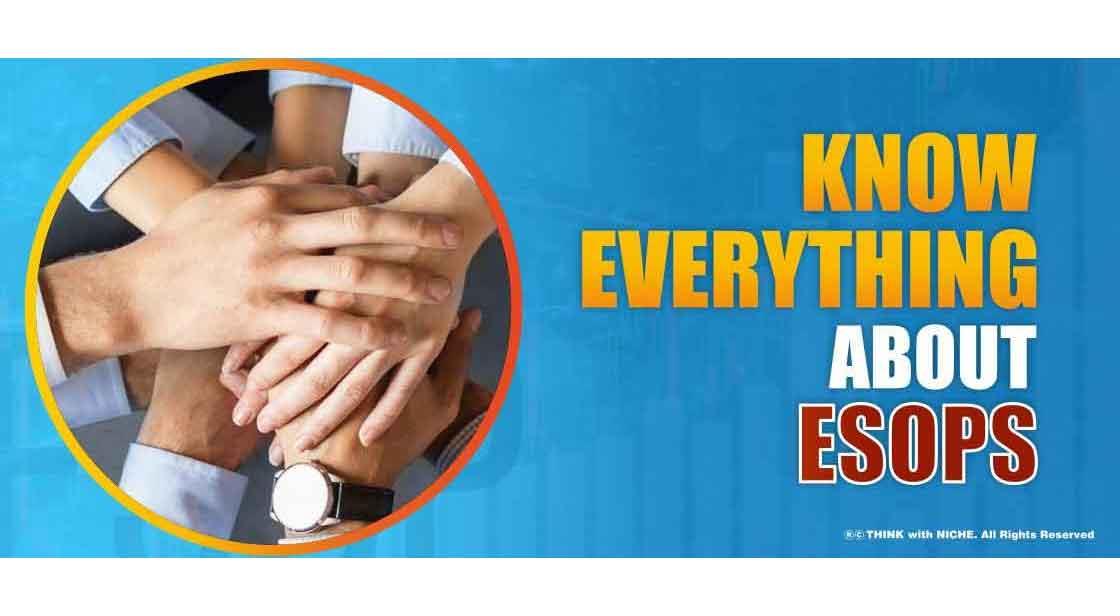Know Everything about ESOPs

Blog Post
ESOPs, are a form of employee benefit plan that provides employees a share in the company. Employee stock ownership schemes are provided in the form of direct shares, profit-sharing programs, or incentives, and the employer has a complete choice over who is eligible. Here read the below article to know more about ESOPs. #ThinkWithNiche
ESOP is an acronym for employee stock ownership plan. Employees in an ESOP are given business shares based on how long they have worked for the company. It's usually part of a pay package that includes shares that vest over time. It is a type of employee benefit plan in which employees are given stock shares that give them a stake in the company.
To begin, a trust fund is formed for an employee stock ownership scheme. Companies can deposit newly allotted shares in the trust, or borrow money to buy company shares.
Employee stock ownership plans are designed to align the motivations and interests of workers with the company's shareholders. ESOPs provide several management benefits, including incentivizing employees to focus on business performance. Here are a few of the benefits of having an ESOP.
Benefits to the Employer
The law mandates that an ESOP invest most of its contributions in employer stock. It's also the only qualified employee benefit plan that may borrow money to acquire company stock on business credit. These characteristics provide a business using an ESOP as a corporate finance tool with great flexibility, allowing it to fulfill corporate goals that would otherwise be impossible to attain.
By leveraging with third-party lenders, the ESOP can be utilized as a corporate financing mechanism to issue new stock to settle the outstanding debt or to purchase assets or outstanding shares. Because contributions to an ESOP are completely tax-deductible, an employer can make both principal and interest payments on the ESOP's debt service obligations using pre-tax funds.
Benefits to the Employees
Employees benefit from the ESOP because the company pays yearly cash and stock contributions to the ESOP. Benefits from the ESOP are dispersed to the accounts of participating workers in the trust established as part of the ESOP. The accrued money in a participant's account is distributed among the participants once he or she retires or leaves the company for other reasons.
The value of an ESOP benefits account, including stock value appreciation, is not taxed to the employee if the account remains in the ESOP trust. Employees aged 55 and more who have been a part of the ESOP for ten years or more must be allowed to diversify a portion of their ESOP benefits accounts.
Benefits to the Stockholders
ESOPs benefit stockholders by providing a quick market for some or all the shares held by shareholders in a closely held company. An ESOP provides an exit option when a majority or controlling stakeholder is ready to retire. Similarly, an ESOP may be the only market for a minority investor in a closely held company.
Using the ESOP benefit rollover, a shareholder can sell shares to an ESOP and defer capital gains taxes. It can also be used to help in estate planning. A majority shareholder might sell all or part of his or her shares in an ESOP to increase personal liquidity while maintaining control of the company.
Productivity has Increased
We work with a lot of ESOPs in companies that encourage employee loyalty but have low participation percentages. Individual workers will profit instantly from a business's success and will feel a sense of ownership as a result of an ESOP giving them a stake in the company. As a result of this, companies with employee stock plans may see an improvement in productivity and overall performance. When employees have a financial stake in the firm, their morale and trust in the organization may improve.
Alternative Exit Strategy for Aged Owners
As previously stated, the tradition of passing along family businesses is dwindling. Furthermore, because COVID-19 slowed down merger and acquisition activity, business owners who wanted to retire had fewer options. If an ESOP is established, owners will not have to sell their company to a third party. They can trust that it will be kept by the employees. They have the option of keeping their information private and not sharing it with potential buyers. Owners who want to stay with their business for a long period might donate shares to an ESOP over time rather than all at once.
Benefits of Taxation
ESOP schemes provide a variety of tax advantages. For C-corporations, contributions to ESOPs are tax-deductible, and the amount retained by the ESOP is tax-free for S-corporations. Employee contributions are not subject to taxation. Individual employees must only pay tax on the ESOP when they withdraw the assets after retirement, just like in a typical retirement plan. Stock gifts are also tax-deductible, as are contributions used to repay ESOP debts.
Attracting Top Talent & Retaining Current Employees
Stock options are routinely forfeited by employees who leave a company after less than two years. After four years, an employee may be entitled to 40% of their stock if they quit. This vesting technique, which refers to the amount of time an employee must work for a company before being eligible for a share payout, motivates employees to stay with the company, if possible, to receive the most money when they decide to leave. Having the ability to buy a share of a company might be a tempting bonus for top employees searching for new opportunities since it provides a secure retirement plan.
No Change in Governance
With an ESOP in place, an owner who wants to leave their company won't have to worry about the disruption that a change in governance usually produces. It allows the company to maintain long-term connections with suppliers, distributors, and clients while still retaining management. Employee loyalty to the company can be bolstered by the continuity of employee ownership, which avoids the upheavals that come with changing ownership.
It is Flexible
Shareholders can take cash out in little amounts over time or sell only a piece of their stock. Even after selling their ownership in the company, they may remain active. Furthermore, if an employee retires or leaves the company, they have the option of keeping their stock, giving them a voice in the company even after they depart.
It is Confidential
ESOPs keep employee information private. It guarantees that the data of members is kept private and secure. ESOPs have fair terms and conditions with no hidden fine print, and they assist employees when they are most in need.
Conclusion
To summarize, an employee stock ownership plan (ESOP) is a popular employee benefit and business financing instrument, with configurations ranging from simple to complex. Competent attorneys, accountants, and administrators should evaluate its viability to ensure that it is tax-deductible and meets the Department of Labor's employee benefit plan standards.
You May Like
EDITOR’S CHOICE












